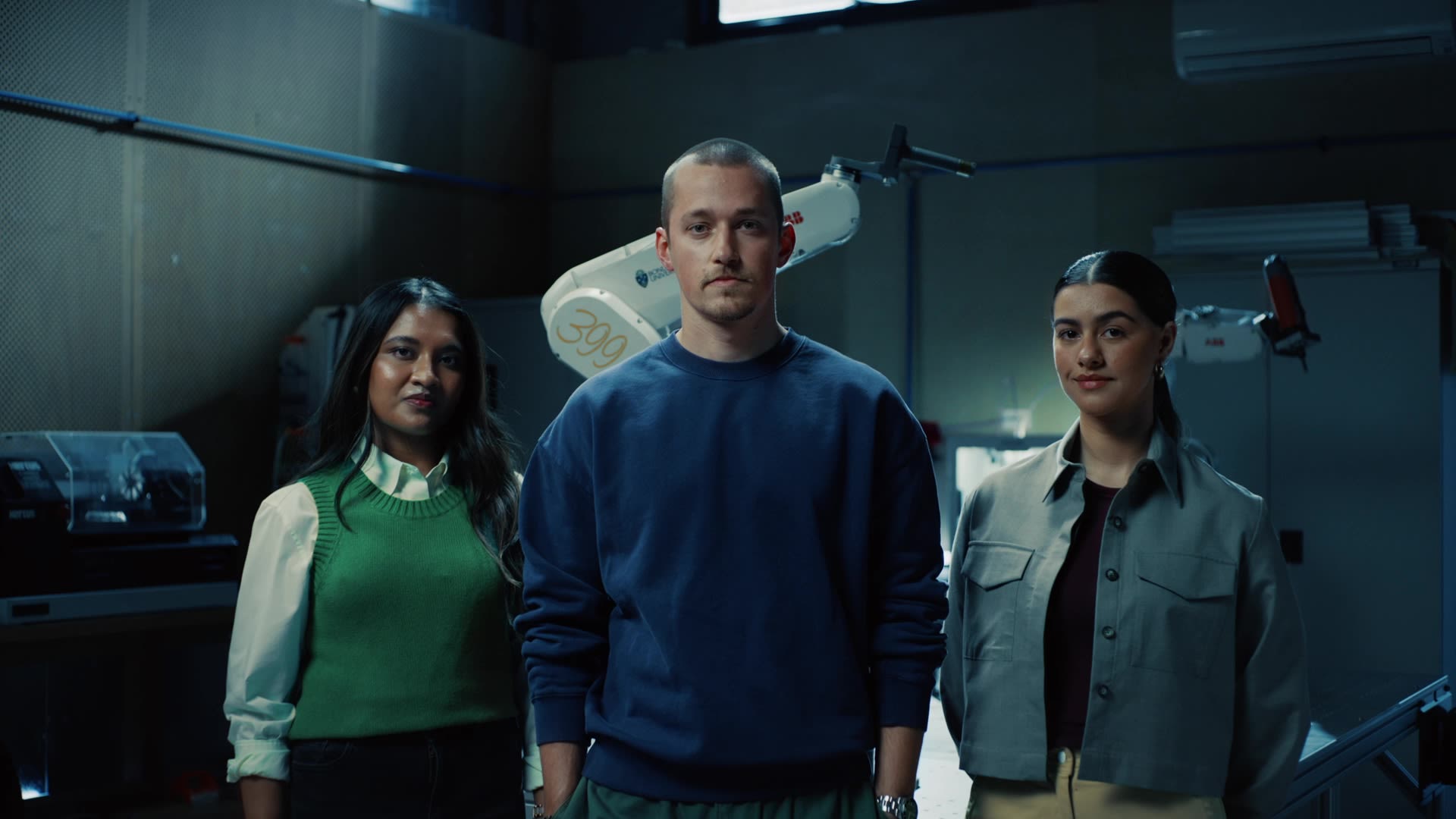

Bond’s own explains why lofty goals call for a community to match.
Ambition grows in good company, among peers, mentors, and communities who share drive, challenge thinking, and celebrate wins. That’s the spirit behind Bond University's new brand platform, Ambition Loves Company.
It’s an idea that’s intuitive — and backed by science. From psychology to education, organisational behaviour, and social connection, there’s compelling evidence that our goals are shaped by the people around us. Belonging, shared purpose, and supportive relationships help fuel motivation and accelerate personal growth.
To explore the research and lived experience behind this thinking, we spoke with some of Bond’s leading minds: Associate Professor Libby Sander, Associate Professor Dr George Hrivnak, Assistant Professor Megan Lee, and Law and International Relations graduate Saxon McGregor. Together, they offer powerful insight into why ambitious people seek out and succeed in communities like Bond.
The science of shared drive
Associate Professor of Organisational Behaviour Dr Libby Sander says humans tend to model the behaviour of those around us, a phenomenon called emotional contagion. “If you're surrounded by high achievers striving for success, it can create a social effect where you want to model or learn from that," Libby says.
“If you join a team where people are taking risks, trying new things, and aiming for ambitious goals, that emotional contagion spreads.
“It’s something leaders are conscious of when shaping team or organisational culture, because the language we use and how we communicate can shift what's seen as possible.
“Often, things we think are impossible just haven’t been tried yet. When we adopt a lens of ‘Let’s see if we can make this happen,’ that mindset becomes contagious.”
As well as emotional contagion, Bond University Assistant Professor of Management Dr George Hrivnak says there is goal contagion and goal motivation.
“When you’re in a community built around a growth mindset, where people are genuinely engaged in learning and supported in that process, it becomes infectious,” George says.
“Albert Bandura’s Social Learning Theory highlights this; the idea that we don’t just learn by doing, we also learn by observing. So, when you’re in a like-minded community that shares that drive, and you feel connected to others, that social learning becomes incredibly powerful.
“It helps create a self-fulfilling loop — that sense of ‘this is how we do things here.’ And that’s what culture is: the unwritten rules and norms that guide how a place works and how people treat one another. That shared mindset is what helps Bond build and reinforce a strong culture of growth.”
Saxon McGregor recently graduated from Bond University with a Bachelor of International Relations/Bachelor of Laws (Honours) degree, and says he experienced the benefits of shared ambition from his first day on campus.
“Our class was asked, ‘What’s your career aspiration?’ I hesitated to say I wanted to be an Australian ambassador because, in past environments, that kind of ambition would’ve been shut down pretty quickly,” Saxon recalls.
“So, I softened it. I said maybe I could be a diplomat, and hopefully an ambassador, by my late fifties. But the response I got from classmates was: ‘Why fifties? Why not late twenties?’.
“That moment was incredibly reassuring. It made me realise it’s okay to be ambitious, you don’t have to undersell your goals.
“At Bond, even the wildest aspirations feel achievable. The environment makes ambitious goals feel ordinary, and encourages you to aim even higher.”

The science of shared drive
Associate Professor of Organisational Behaviour Dr Libby Sander says humans tend to model the behaviour of those around us, a phenomenon called emotional contagion. “If you're surrounded by high achievers striving for success, it can create a social effect where you want to model or learn from that," Libby says.
“If you join a team where people are taking risks, trying new things, and aiming for ambitious goals, that emotional contagion spreads.
“It’s something leaders are conscious of when shaping team or organisational culture, because the language we use and how we communicate can shift what's seen as possible.
“Often, things we think are impossible just haven’t been tried yet. When we adopt a lens of ‘Let’s see if we can make this happen,’ that mindset becomes contagious.”
As well as emotional contagion, Bond University Assistant Professor of Management Dr George Hrivnak says there is goal contagion and goal motivation.
“When you’re in a community built around a growth mindset, where people are genuinely engaged in learning and supported in that process, it becomes infectious,” George says.
“Albert Bandura’s Social Learning Theory highlights this; the idea that we don’t just learn by doing, we also learn by observing. So, when you’re in a like-minded community that shares that drive, and you feel connected to others, that social learning becomes incredibly powerful.
“It helps create a self-fulfilling loop — that sense of ‘this is how we do things here.’ And that’s what culture is: the unwritten rules and norms that guide how a place works and how people treat one another. That shared mindset is what helps Bond build and reinforce a strong culture of growth.”
Saxon McGregor recently graduated from Bond University with a Bachelor of International Relations/Bachelor of Laws (Honours) degree, and says he experienced the benefits of shared ambition from his first day on campus.
“Our class was asked, ‘What’s your career aspiration?’ I hesitated to say I wanted to be an Australian ambassador because, in past environments, that kind of ambition would’ve been shut down pretty quickly,” Saxon recalls.
“So, I softened it. I said maybe I could be a diplomat, and hopefully an ambassador, by my late fifties. But the response I got from classmates was: ‘Why fifties? Why not late twenties?’.
“That moment was incredibly reassuring. It made me realise it’s okay to be ambitious, you don’t have to undersell your goals.
“At Bond, even the wildest aspirations feel achievable. The environment makes ambitious goals feel ordinary, and encourages you to aim even higher.”
Libby says humans tend to model the behaviour of those around us.
Libby says humans tend to model the behaviour of those around us.
The company you keep
There’s a saying ‘you are who you surround yourself with’; it’s true our motivation and ambition are influenced by the people, cultures, and communities around us.
Libby explains there are intrinsic and extrinsic types of motivation, and most people experience a combination of both. "You have your internal drivers, but you're also influenced by what’s around you: family, peers, mentors, workplaces,” Libby says.
“That influence can be aspirational. When you're surrounded by people who are striving, stepping out of their comfort zone, and trying new things, it can create a culture of ‘we do things differently here.’ That has a spillover effect, through social learning and modelling, on how others behave too.
“Role models are important for aspiration, ambition, and the belief that, ‘Hey, this is possible for me.’”
Assistant Professor in Psychology Dr Megan Lee says young adulthood is a critical time for exposure to these positive influences.
“We know from psychology the ages of around 16 to 25 are critical for identity development; the prefrontal cortex and amygdala are still forming, and habits and behaviours are being shaped. It’s a time when students are figuring out who they are, not just academically, but as people,” Megan says.
“In positive psychology, we understand that our habits are shaped by three key influences: the people closest to us, like family and friends; the tribe we belong to — our broader social group; and those with status or prestige, who we tend to look up to.
“At Bond, all three of those drivers are present. Students are supported by those closest to them — family, friends, lecturers, and peers. They become part of a like-minded tribe, surrounded by others who share their values and drive. All of these elements shape their habits, identity, and ambition.”

The motivational trifecta
If our surroundings and our community shape our ambition, what helps to fuel it? George says Edward Deci and Richard Ryan’s Self-Determination Theory identifies three core drivers for motivation: autonomy, competence, and relatedness.
“Autonomy is about having the freedom to set your own goals and pursue what matters to you. So much of Bond’s culture is built from the way we support and treat students to nurture that autonomy,” George says.
“Competence is about mastery. Of course, any university aims to build competence, but at Bond, our focus on growth mindsets and active, experiential learning allows students to develop deeper skillsets. It’s not just learning about something, it’s learning how.
“And relatedness is about connection and belonging. In small classes, those relationships with peers and educators are real. If you’re absent, someone notices. Your educator checks in. You feel seen and supported.
“When all three of those needs, autonomy, competence, and relatedness, are met, students develop intrinsic motivation. That drives students through the hard work of learning. And when that happens, it creates a kind of perpetual motion, a self-fulfilling cycle that captures part of what makes Bond so special.”
Saxon credits Bond’s smaller class sizes, formal mentorship programs, and informal culture of caring with helping to nurture motivation in students, alumni, and staff.
“I’ve been lucky to learn alongside some incredibly ambitious people; people who know who they are, what they want to do, and most importantly, the impact they want to have,” Saxon says.
"Bondies are not just chasing a job title, they’re chasing the difference they want to make, and it’s contagious. You see it all around you, people from all kinds of study areas, all doing amazing things.
“By the time you graduate, you don’t just leave with a degree. You leave with a network: a future architect, lawyer, doctor, minister, or diplomat, and they're your friends. You’re not boxed in by your degree. You’re just known as a Bondy.”
Built for big goals
Bond’s culture of ambition is by design. The smaller class sizes, immersive and in-person learning modes, and personalised education experience help equip students with the ideal environment to thrive. George says the University’s entrepreneurial background and “can-do, upstart attitude” attract people with a growth mindset.
“People with a growth mindset believe they can learn, change, and get better when given the opportunity. And when you start to gather a critical mass of those kinds of people, you begin to shape a culture around that,” George says.
“There’s some research that builds on Carol Dweck’s work on growth mindsets. One of her protégés, Mary Murphy, developed the idea of ‘cultures of growth’, which extends the growth mindset concept into an organisational context. I think Bond fits that mould; a collective group of people who believe in the capacity to grow, learn, change, and adapt.
“It’s not just about small class sizes, it’s what those numbers allow us to do. They let us focus on active, experiential learning rather than passive lectures. Our educators work hard to know every student by name, and students get to know each other too.”
Megan says Bond’s unique experience means you’re not just one of 500 students in a lecture theatre, you’re seen, supported, and set up to thrive.
“When you come to Bond, you’re immersed in your learning, not just through attending class, but by engaging deeply with your peers and your lecturers. We know your name. We know who you are. From the beginning of your degree to the end, we’re here to support you,” Megan says.
“That’s why the face-to-face experience is so important. It gives students the full university experience: the social networks, peer learning, and the relationships they’ll carry into their careers. All play a vital role in shaping their identity.
“It’s not just the students at Bond who are ambitious; it’s the staff as well. We role model ambition every day by talking to students about our research and the things we’re working on outside of teaching. We share our ambitions with them, so they can see that striving for something bigger is part of the culture here.”

Where ambition belongs
At Bond, ambition feels like a shared energy. It’s in intimate lecture spaces and start-up hubs, in late-night brainstorms and early morning sport training. It fosters a sense of belonging, which Libby says is a fundamental human need.
“It looks different for everyone, but it’s essential that we create environments, spaces, cultures and processes that allow people to feel like they belong,” Libby says.
“Many studies show the critical role psychological safety plays in high-performing teams. When people feel they can be themselves — take risks, make mistakes, or speak up if something doesn’t feel right — that’s when teams thrive.
“As young adults, we need experiences that expand our horizons. And in a world that's changing so rapidly, with technology evolving, and complex global, economic and social issues emerging, we desperately need new roles and solutions we haven’t even imagined yet. Being exposed to people who are thinking differently or doing unexpected things sparks that inspiration.
“That’s one of the things I really love here; Bond is very different. You know every student personally, what they want to do, what they might be struggling with. You take a personal interest and support them to go where they need to go.”
“As young adults, we need experiences that expand our horizons.”
Saxon agrees and says at Bond, you’ll find people who challenge you, back you, and walk beside you. People who show you what’s possible and then help you get there.
“You feel more confident putting yourself out there, and you build the resilience to bounce back if things don’t go to plan. You’ve got plan A, B, and C, and they’re all good plans,” Saxon says.
Since his Bond experience, Saxon says he feels bolder and braver and tells future students to “say yes to everything”.
"Keep doors open or, better yet, bust them open. Take a peek at what’s behind, and if it doesn’t work out, move on to the next door. But don’t just do a soft knock and walk away. Open the door, step in, and experience what that opportunity might be,” he says.
“Coming into Bond, you don’t need to know all the answers. This experience is a training ground, a tool to help get you where you want to go. Your ambitions can evolve, and they should. Be open to that evolution.
“And when you eventually walk out the doors, you’ll be able to look back and see yourself here; the impact you had, the people you connected with, and the ambition that grew within you, which you will then go and share with the world.”
Published on Wednesday, 23 July, 2025.
Original thinking direct to your inbox

Stories from Bond


